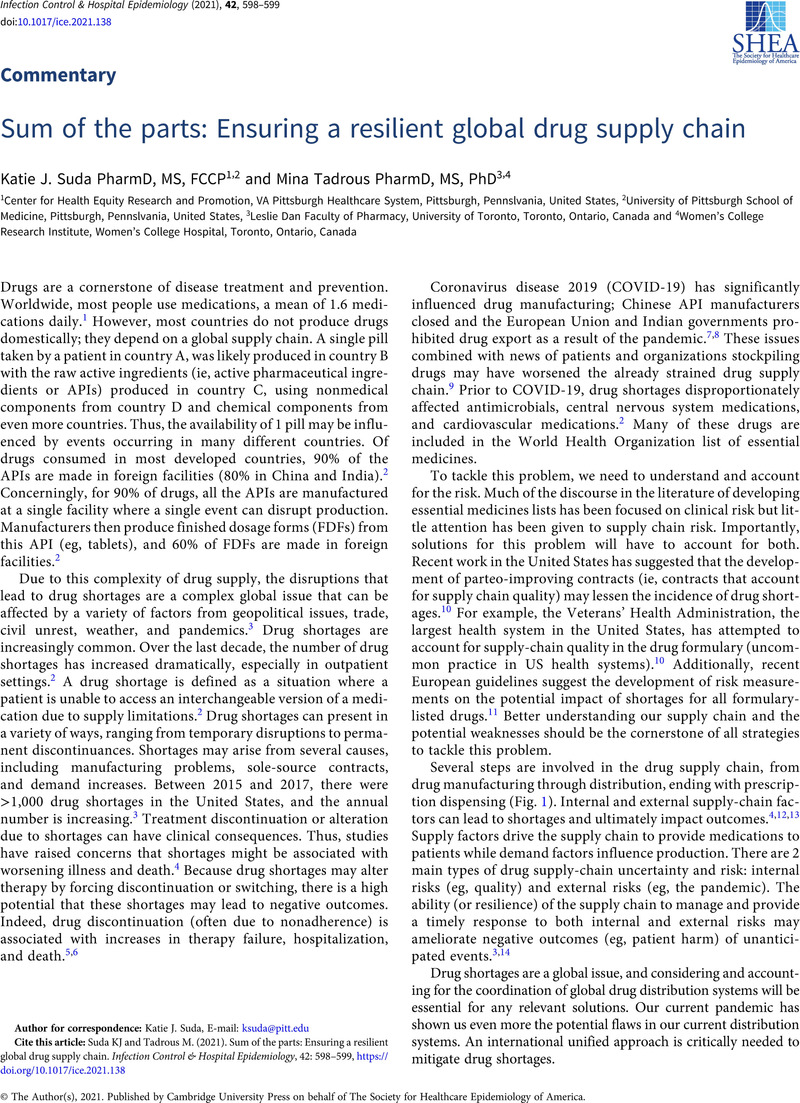Crossref Citations
This article has been cited by the following publications. This list is generated based on data provided by Crossref.
Zeitouny, Seraphine
Suda, Katie J
Mitsantisuk, Kannop
Law, Michael R
and
Tadrous, Mina
2021.
Mapping global trends in vaccine sales before and during the first wave of the COVID-19 pandemic: a cross-sectional time-series analysis.
BMJ Global Health,
Vol. 6,
Issue. 12,
p.
e006874.
Khouja, Tumader
Mitsantisuk, Kannop
Tadrous, Mina
and
Suda, Katie J
2022.
Global consumption of antimicrobials: impact of the WHO Global Action Plan on Antimicrobial Resistance and 2019 coronavirus pandemic (COVID-19).
Journal of Antimicrobial Chemotherapy,
Vol. 77,
Issue. 5,
p.
1491.
Maryniak, Anna
2022.
Building Resilience Attributes of Supply Chains from the Perspective of their Types.
Management Systems in Production Engineering,
Vol. 30,
Issue. 3,
p.
253.
Ledlie, Shaleesa
Tadrous, Mina
McCormack, Daniel
Campbell, Tonya
Leece, Pamela
Kleinman, Robert A.
Kolla, Gillian
Besharah, Jes
Smoke, Ashley
Sproule, Beth
and
Gomes, Tara
2023.
Assessing the impact of the slow-release oral morphine drug shortages in Ontario, Canada: A population-based time series analysis.
International Journal of Drug Policy,
Vol. 118,
Issue. ,
p.
104119.
Yadav, Sachin
and
Singh, Surya Prakash
2023.
Importance of Machine Learning for Digital Resilient Supply Chain.
p.
0001.
Yadav, Sachin
and
Singh, Surya Prakash
2024.
Machine learning-based mathematical model for drugs and equipment resilient supply chain using blockchain.
Annals of Operations Research,
Gaudette, Étienne
Rizzardo, Shirin
Pothier, Kevin R.
and
Tadrous, Mina
2024.
Competition in International Generic Drug Markets.
JAMA Health Forum,
Vol. 5,
Issue. 10,
p.
e243391.
Santhireswaran, Araniy
Bjørk, Emma
Harbi, Hanin
Tadrous, Mina
and
Pottegård, Anton
2024.
Keep Your Guard Up: The Potential Impact of Drug Shortages on Pharmacoepidemiological Studies.
Pharmacoepidemiology and Drug Safety,
Vol. 33,
Issue. 10,
Manapure, Shreyash
Pachare, Akash
Shirbhate, Rushikesh
and
Manapure, Bhushan
2024.
Antibiotics Consumption and Antibiotic Resistance during and Post Covid-19: Impact on Global Health.
Research Journal of Pharmacology and Pharmacodynamics,
p.
233.




